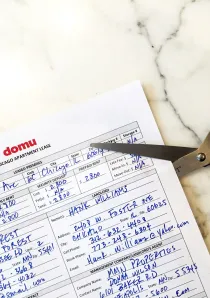After browsing a selection of the best apartments for rent right now, there it is: a place with the correct number of bedrooms, located in a desirable neighborhood, and it's within budget. It's the perfect apartment! Renters might be familiar with this hypothetical scenario if they are experienced in searching for apartments online. But what happens when renters take the next step after locating that "perfect" apartment? They may walk up to the apartment building and experience a moment's hesitation. They might wonder, "Is this place for real?," or even ask themselves, "Is the person who posted the ad for real?"
How can renters avoid that seed of doubt and quell uncertainty about the apartment they are seeking? If they know that the landlord is who they say it is online and that the business is legit, it goes a long way to make renters feel more confident about the apartment. And more confidence in the apartment hunting phase might lead to leases getting signed faster. After all, isn't that the ultimate goal for renters and landlords alike during the apartment search process?
Here are the best ways for renters to confirm a landlord's identity while looking for an apartment:
Check phone numbers and physical addresses
The Internet is a vast repository of knowledge as well as records. Renters who have discovered the apartment of their dreams while browsing online are also just a few more clicks away from securing more data on that apartment's owner(s). Running a quick search for real estate sales records or just double-checking the phone number provided in the online listing against search results may provide an added layer of assurance to renters, before they book their apartment tour.
Many reputable property managers have websites for their businesses which means renters may be able to cross-check the name and addresses provided on the apartment listing against the property manager's office, website, or even confirm the information with a call to the property manager.
Get a snapshot of a driver's license or other formal ID
The larger and medium-sized real estate management firms may have up-to-date websites. But what about smaller landlords who manage a small portfolio of properties? Aside from a quick round of Googling names, the quickest route to verify that a landlord is the same person he or she purports to be in an online listing, is to request a snapshot of their ID, such as a driver's license.
This simple step will also help renters attach a face to the name that they've seen on the listing, so there will be less need for the tentative question, "Hi, are you So-And-So from the listing?" when they arrive for the apartment tour.
Ask for references from previous and existing tenants
The online community of renters may provide a bit of validation for renters who are doing their own due diligence on apartment landlords. For renters who are active on social media, they may want to pose a question to their online networks about certain management companies or landlords. Finding like-minded groups online may seem daunting at first, but running a few keyword searches on platforms such as Twitter, LinkedIn, and Reddit can supply renters with a truly staggering amount of discourse.
Keep in mind, though, that asking strangers on the Internet for anonymous feedback may not result in the most truthful responses. It may be better to reach out directly to friends, coworkers, or acquaintances to get the most reliable responses about a landlord's track record.
These are merely suggestions for renters who want to make double sure that they are heading into an authentic and trustworthy arrangement for their next apartment rental. This is not to allege that any particular online apartment listings are suspect -- far from it. If you are looking to rent an apartment, it's good practice to be vigilant before sharing any private information. Moreover, renters should never send money to a landlord before signing a lease agreement.
Disclaimer: The general information which Domu offers about Chicago landlord-tenant law is not a comprehensive summary and not intended as legal advice. Domu endeavors to provide accurate guidance, but the law is subject to change, and Domu is neither a law firm or provider of legal services. Questions about your particular leasing situation should be directed to a lawyer. All content provided here is subject to Domu’s Terms of Use, which are available here.




